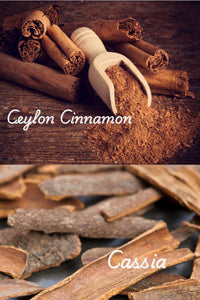
Ceylon Cinnamon Vs Cassia
Ceylon Cinnamon: The Superior Choice
Cinnamon is one of the most beloved spices worldwide, adding warmth and depth to both sweet and savory dishes. However, not all cinnamon is the same. The two most commonly available varieties—Ceylon cinnamon and Cassia cinnamon—differ significantly in flavor, health benefits, and culinary uses. When it comes to choosing the best cinnamon, Ceylon cinnamon stands out as the superior choice in terms of taste, safety, and overall quality.
What is Ceylon Cinnamon?
Ceylon cinnamon, often called "true cinnamon," comes from the inner bark of the Cinnamomum verum tree, which is native to Sri Lanka. This variety is known for its delicate, slightly citrusy flavor and complex aroma. The bark is thin, soft, and easy to grind, making it the preferred choice for gourmet recipes and high-quality cinnamon products. Due to its refined taste and exceptional quality, Ceylon cinnamon is prized by chefs and health-conscious consumers alike.
What is Cassia Cinnamon?
Cassia cinnamon, derived from Cinnamomum cassia (also known as Cinnamomum aromaticum), is a lower-quality substitute commonly found in supermarkets. It originates from China, Indonesia, and Vietnam and is characterized by its strong, pungent flavor with a hint of bitterness. The bark is thick and hard, making it difficult to grind. Cassia is often used in commercial spice blends and processed foods due to its affordability, but it lacks the complexity and elegance of Ceylon cinnamon.
Why Ceylon Cinnamon is the Better Choice
-
Superior Flavor Profile
-
Ceylon cinnamon has a delicate, mildly sweet taste with citrus and floral undertones, making it ideal for enhancing both sweet and savory dishes.
-
Cassia cinnamon is overpowering, harsh, and lacks the subtle complexity that makes Ceylon so desirable.
-
-
Health Benefits and Safety
-
Ceylon cinnamon contains very low levels of coumarin, a natural compound that can be harmful in high doses.
-
Cassia cinnamon has significantly higher coumarin content, which can pose serious health risks if consumed regularly over time.
-
-
Premium Quality and Culinary Versatility
-
Ceylon cinnamon’s soft, multi-layered bark allows it to be easily ground into a fine powder for cooking and baking.
-
Cassia cinnamon’s thick and rough bark makes it more challenging to use and less refined in culinary applications.
-
-
Purity and Authenticity
-
Ceylon cinnamon is sourced from Sri Lanka, where it has been cultivated with care for centuries, ensuring a product of unmatched quality.
-
Cassia cinnamon, being the cheaper and more common variety, is often used in processed foods and lacks the authenticity of true cinnamon.
-
Why You Should Choose Ceylon Cinnamon
For those who value premium quality, safety, and rich flavor, Ceylon cinnamon is the best option. Whether you're using it for baking, beverages, or health benefits, its superior characteristics make it well worth the investment. While Cassia may be more affordable, its high coumarin levels and inferior taste make it a less desirable choice for long-term use.
Next time you reach for cinnamon, choose the variety that enhances your culinary experience while supporting your health. With its refined flavor, rich history, and unparalleled benefits, Ceylon cinnamon is the clear winner.
